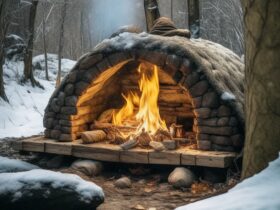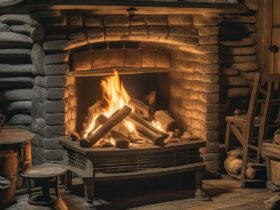When it comes to surviving in the great outdoors, having a shelter that can protect you from the elements is crucial. And one of the key components of a survival shelter is a fireplace. A fireplace can make or break your survival shelter, as it provides warmth, light, and a means to cook food.
In a survival situation, staying warm is essential for your well-being. A fireplace can provide much-needed heat to keep you comfortable and prevent hypothermia. The warmth from a fire can also help you dry out wet clothing and gear, which is vital for staying healthy in the wilderness. Additionally, the light from a fire can improve your morale and make it easier to navigate around your shelter at night.
A fireplace also serves as a cooking source, allowing you to prepare hot meals and purify water. In a survival situation, having access to cooked food can boost your energy levels and improve your overall health. By cooking food over a fire, you can also avoid the need for portable stoves or fuel, making it a more sustainable option for long-term survival.
However, it’s important to note that a poorly constructed fireplace can actually do more harm than good. A poorly ventilated fire can fill your shelter with smoke, leading to respiratory issues and potentially a dangerous situation. A fireplace that is not properly contained can also pose a fire hazard, especially in dry or windy conditions.
To ensure that your fireplace is safe and effective, it’s important to follow some basic guidelines:
– Build your fireplace away from flammable objects, such as tents or dry vegetation.
– Use rocks or a fire ring to contain the fire and prevent it from spreading.
– Ensure that there is proper ventilation to prevent smoke buildup in your shelter.
– Always have a means to extinguish the fire, such as water or a fire extinguisher.
In conclusion, a well-built and properly maintained fireplace can be a game-changer when it comes to surviving in the wilderness. It provides warmth, light, and a means to cook food, making it an essential component of any survival shelter. By taking the time to build a safe and effective fireplace, you can increase your chances of staying comfortable and healthy in a challenging environment.







Leave a Reply